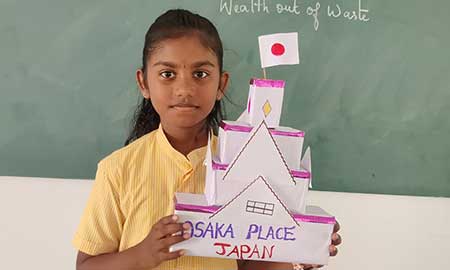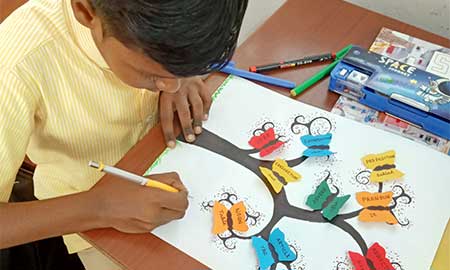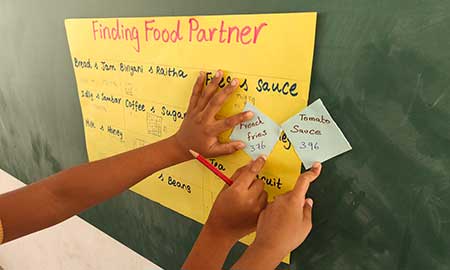The Primary curriculum focuses on three domains – Literacy Skills, Numeracy Skills, and Socio-emotional development. We follow a theme based, child-centric approach.
Children begin the transition from concrete to abstract. Children are able to visualise, imagine and form ideas. Children are curious, want to explore and learn. The Primary years focuses on nurturing the natural curiosity of the child in school and beyond. The environment, curriculum and teaching learning methodologies create a joyful learning environment. This helps children develop a love for learning which leads them to become lifelong learners.
A healthy teacher-student ratio ensures a wholesome and focused classroom experience with better student engagement. Children are assessed through formative and summative assessments.
Transition from Kindergarten to Primary
The homeroom system in Primary aids a transition from Kindergarten to Primary. In this learning environment, the child is facilitated by two teachers – a class teacher and a partner teacher – who teach all the core subjects. The homeroom system aids the child in adapting, trusting and connecting with the teacher.
This system also supports socio-emotional development in the child’s formative years by helping the child connect, bond and build relationships. The homeroom teaching-learning environment is followed for Grades 1 to 3.
Socio-Emotional Development – Circle Time
The school day for children at the Primary begins with Circle Time for about 20-30 minutes. Our circle-time activities are multi-faceted and promote the importance of both the individual and the community. Mindfulness, brain power yoga, sharing experiences and listening to others are emphasized in this time, to promote empathy and sensitivity.
Literacy & Numeracy Skills
English: The English Curriculum is designed to help children develop listening, speaking, reading and writing skills and become proficient in the sub-skills of the language, like comprehension, vocabulary and grammar.
Math: The Math curriculum is designed to help children develop mathematical thinking and quantitative reasoning problem solving skills. Children are encouraged to apply these skills to formulate and solve problems to attain proficiency in the fundamental Mathematical concepts.
EVS (Grade 1-3): Children learn Environmental Studies (EVS), focusing on the natural, social and cultural environment in an integrated manner.
Science (Grades 4 to 5): In grades 3 to 5, the Science curriculum encourages development of curiosity, analytical and critical thinking skills through hands-on-learning. Children also learns through simple experiments and projects in the class.
Social Studies (Grades 4 to 5): The Social Studies curriculum is designed to include a range of content drawn from the disciplines of History, Civics and Geography aimed at developing analytical and critical thinking skills, inquiry, reasoning and map marking skills, besides teaching active citizenship.
Languages:
Tamil: Children learn Tamil as a second language from grade 1.
The curriculum focuses on
1. providing exposure to the language through systematic and age-appropriate language building
2. developing listening, speaking, reading and writing skills
3. vocabulary and sentence formation
Hindi:
Children learn Hindi as a third language from grade 1.
The curriculum is designed to develop listening, speaking, reading and writing skills to provide a foundation for the language.
Computer Science Curriculum:
The Computer Science curriculum for grades 1 to 5 is designed to promote the use of technology to accomplish tasks, communicate effectively and securely, thereby making students become competent, responsible and critical users of technology. There is a gradual emphasis placed on developing logical and problem-solving skills.
Academic Support
Learning Lab – Grades 1 to 5: The resource rich learning lab is a space which supports children in bridging the gap in learning and catch up with their peers. It is not only for children with severe difficulties, but for all children who face some kind of barrier to learning.
Inclusion is reaching out with sensitivity to every child, irrespective of their differences. We provide education for all children in an environment where they get an opportunity to translate potential into reality. Trained teachers assess the current performance level (CPL) and based on the data create an individual Education Plan (IEP) for each child.
Assemblies
Assemblies are an integral part of our regular working days. These are theme-based and are organised and conducted by the students themselves, building their organisational skills and team work. Assemblies provide opportunities for children to showcase their creativity and talents, and share their views on important issues.
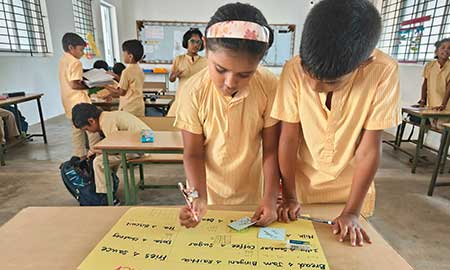
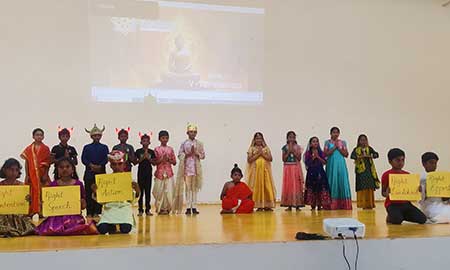
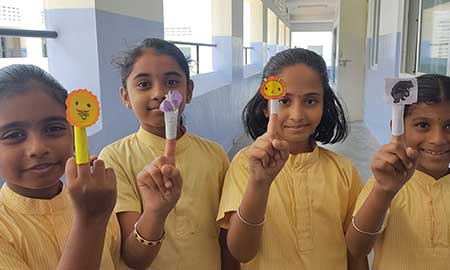
Co-curriculum
Music: Music can enhance cognitive function in children. Musical activities (such as playing an instrument, singing or just listening to music) stimulate the brain and improve concentration. Children develop a sense of rhythm and learn to appreciate various forms of music.
Children learn different songs from regional, folk, devotional and Carnatic styles. Lessons on Carnatic, vocal and voice culture are given to improve their singing.
Art: Art is an integral part of the curriculum. Teachers identify age-appropriate kinaesthetic activities and incorporate them into the curriculum. Students are encouraged to create their own works of art for festivals and other special occasions. The complexity of the activity increases with each grade level.
Dance: Dance is one of the co-curricular activities offered. Students are introduced to diverse dance forms ranging from Bharathanatyam to folk traditions.
Theatre: The theatre sessions focus on enhancing the intuitive, instinctive, impulsive and imaginative skills of the students. The activities pan across the three main divisions of theatre – acting, designing and direction to help the students understand heightened reality, acquire narrative skills and delve deeper into texts and contexts.
Theatre is an integral part of the curriculum till grade 8 and contributes to building confidence in children and promotes greater participation in the classroom and beyond. We partner with experts in the field to provide our students with a rich learning experience.
Learn More about Theatre at CVM
Physical Education: The physical education curriculum is structured to give children an opportunity to improve their physical fitness in terms of endurance, strength, speed, agility, coordination, flexibility and balance. Through various physical activities and games, we focus on the different forms of fundamental movements and skills like running, jumping, skipping involving all gross motor skills of the children.
Learn More about Sports at CVM
Yoga: Children are encouraged to pursue yoga as a way of life. Chanting, brain power yoga and asanas help students find their centre, improve focus and maintain physical/emotional balance. The yoga program includes dynamic vinyasa sequences to create interest and energy.
Purna Vidya – Vedic Heritage Teaching Program: As a part of the culture-based value education and holistic educational approach, Purna Vidya is a part of the curriculum from Grades 1 to 8. The vedic heritage teaching programme is a guide for educational institutions, communities and families that wish to teach vedic heritage to their children in an authentic, systematic manner. The programme develops an understanding of Dharma (Values) in the Vedic tradition. It consists of teaching materials, assignments, lesson plans, and fun filled exercises.
The subject matter has been designed to be taught to children over a period of 12 years using books and workbooks. Individual Values such as Truthfulness, Not hurting others, Respect, Straightforwardness, Friendliness and many other Universal values are analyzed.
(Inspired by and drawn from Pujya Swami Dayananda Saraswati ji’s foreword)
Field Trips and Outbound Trips: Field trips and outbound trips are planned to provide students with real-life and authentic experiences. These trips help widen the horizons of knowledge and broaden the scope of learning beyond the classroom. Field trips focus on specific and planned objectives through observation, experiential learning and reflection. Team-building activities like trekking and camping are integral parts of the outbound trips.
Learn More about Field Trips and Outbound Trips
Guest Lectures: Students have opportunities to interact with experts from various fields through regular guest lectures.
Extra-Curricular Activities
Extra-curricular program is aligned to the school’s philosophy and provides opportunities for specializing in Performing Art, Visual Art, Sports after school hours. Children can opt from an array of after-school activities facilitated by both in-house experts and external professionals.
Paid Programs: Students can opt for one or more of the following activities organized with expert facilitators.
- Gymnastics
- Karate
- Table Tennis
- Chess
- Cricket
- Football
- Basketball
- Badminton
- Matte Painting (Grade 3 to 5)
- Pottery & Sculpting (Grade 3 to 5)
- Quiz (Grade 4 and 5)
- Communication and Personality Development (Grade 4 and 5)
- Bharathanatyam
